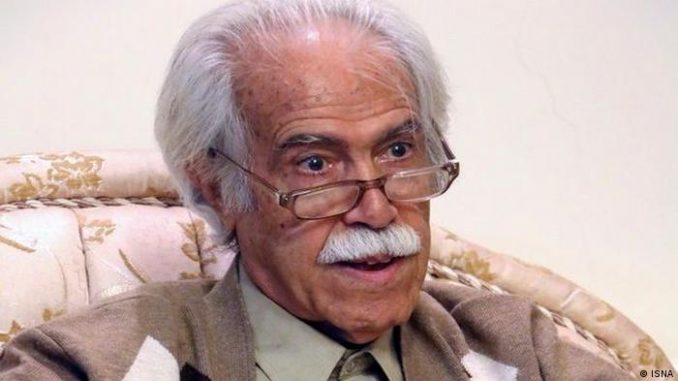
BIO BRIEF
Mansour Owji (November 30, 1937 – May 8, 2021) was a contemporary Iranian poet and writer. He was born in the Darb-e-Astane Seyyed Aladdin Hosein district in Shiraz and went to Astaneh and Farhang elementary schools and Ahmadi junior school there. At Soltani high school, Owji studied literature and obtained his diploma in 1958 as the top graduate of Fars province in the field of literature. In the same year, Owji was simultaneously admitted to the College of Higher Education (Daneshsara-ye Ali) in philosophy and Educational Sciences, Pahlavi University of Shiraz in Political Law, and the Faculty of Literature of Tehran University in English Language and Literature, but due to some family problems, he preferred the College of Higher Education, and in 1961 he received his bachelor’s degree. In 1961, he was employed by the Shiraz Teacher Training Center (affiliated to the Ministry of Education) as a teacher and, meanwhile, he taught English language and literature at Shiraz University, where he received a second bachelor’s degree in that major in 1965. Four years later, he pursued postgraduate studies for a master’s degree in Counseling from Shiraz University (1971). Owji was retired from service of the Ministry of Education in 1990 and was hired afterwards as a professor by Islamic Azad University, Darab Branch in Fars. He finally resigned from teaching in 2009 to focus on his poetic career.
Mansour Owji was among the oldest members of the Writers’ Association of Iran (1967-1968) and a renowned participant in the Khusheh Poetry Nights (held by Ahmad Shamlou, 1967-1968) and the Ten Nights of Poetry held by the Writers’ Association of Iran (1978-1979). His curriculum vita is also marked by a trip together with the Caravan of Iranian Poets (titled ‘Conversations with Nature’) to France, and awards from prestigious cultural institutions, such as the Crystal Cypress Statuette (Of Annual Fajr Poetry Festival).
Owji passed away on May 8, 2021 in Shiraz, having suffered from liver failure for years.
BIBLIO BRIEF
A lot has been written on the poetry of Mansour Owji by contemporary critics and poets such as Simin Behbahani, out of which five monographs are exclusively on his poetic style and achievements:
- In praise of the Poetry of Silence, by Houshang Golshiri;
- In search of a Maniac Flowerو by Kamyar Abedi;
- But of the Bird and the Flower, and The Lasting and the Everlasting, both by Khosrow Qamar;
- Mystery and Narration, by Mohammad-Reza Khalesi.
An overview of the poetry of Mansour Owji
Mansour Owji’s poetry collections are as follows:
- Night Garden [باغ شب] (1964-1965),
- The Exhausted City [شهر خسته] (1967-1968);
- Sleep, Trees, and Solitude [خواب و درخت و تنهایی] (1970-1971);
- This is the Lily Singing [این سوسن است که میخواند] (1970-1971);
- The Bird of Dawn [مرغ سحر] (1978-1979);
- Poems as Short as Life [شعرهایی به کوتاهی عمر] (1979);
- The Voice of Always [صدای همیشه] (1980-1981);
- Brief as a Sigh [کوتاه مثل آه] (1989-1990);
- I’ve Got Such a Feeling [حالی است مرا] (1989-1990);
- In the Morning Light [در روشنای صبح] (an anthology of poems by Persian poets of Fars Province 1991-1992);
- We were not in the Sprit of the Garden [هوای باغ نکردیم] (Selected by Houshang Golshiri, 1993-1994);
- The Notebook of Fruits [دفتر میوه ها] (2000-2001)
In terms of language and poetic expression, Owji’s poems are mostly short and smooth (almost all the critics of Owji have highlighted this as his idiosyncratic technique). One can also refer to his other stylistic features such as the combination of two different meters in a single piece of poetry, lining the New Poem (or in critical terms, stratification of poetry) according to the intended meaning and expression rather than syntax, the use of common meters as well as mastery over the Persian meters (Golshiri, 58,62-63, 70). Also, some critics have considered the brevity of his poetry as inspired by translations of Japanese, Chinese, and Italian poetry and most comparable to the Japanese haiku and Chinese poery (Golshiri, 72-73; Braheni, 1784; Atashi, 21; Alaei, 116; See also Nouri Ala 197-198). The use of alliteration and internal rhyme in various forms (Golshiri, 77-82), symmetric methods of expression, epigraphical openings, metaphors, symbols, and other figures of speech are epitomes of Owji’s poetry (84-87; Alaei, 117). It should also be noted that while the material elements of old and classical Persian poetry are found in Owji’s poetry, making him a true heir of the Persian poetic traditions, he should also be seen as a poet who was speaking in his contemporary language, applying modern narrative methods within poetry – or as Golshiri stated, “presenting a story in poetic form” – and often opening his poems in striking rhythms (Golshiri, 75-76; 88; 93). As for content, he was a poet of the moments and sensual modes – of the worlds of light and darkness (Atashi, 21; Owji, “The Taste of Lemon”, 97, Ibid. “Karnameh …”, 34-37). He should be called a poet of nature and eternity who, in almost every published collection, paid particular attention to the natural world, love, sorrow, death and life. In philosophy and worldview, he was influenced by Hafez and Khayyam (Abedi, 38; Atashi, 123).
References
- Atashi, Manouchehr, “On the margins of Owji’s New Book” [درحاشيه كتاب تازه اوجي], Kelk, Vol. 3, Tehran, 1990-1991. ,
- Owji, Mansour, “The Taste of Lemon” [طعم لیمو], Goharan, Vol. 6, Tehran, 2004-2005.
- Homo, “The Records of a Poet” [کارنامه یک شاعر], The Monthly Book of Literature and Philosophy, Vol. 79, Tehran 2004-2005.
- Braheni, Reza, Gold in Copper, Tehran 1992-1993.
- Abedi, Kamyar, “Composing Poetry with Shiraz in its Summer Evenings” [شاعري با شيراز عصرهاي تابستاني اش], The Monthly Book of Literature and Philosophy, 2000-2001.
- Alaei, Mashiat, “Tasting with a Flavor of Death” [با طعم مرگ درذايقه], Gohran, Vol. 5, Tehran, 2004.
- Golshiri, Houshang, In Praise of the Poetry of Silence [در ستایش شعر سکوت], Tehran, 1995-1996.
- Nouri Ala, Esmail, “The Exhausted City” [شهر خسته], Arash, Volume 2, Issue 3, Tehran 1968-1969


Leave a Reply